HackerRank paved the way for recruiting coding talent with its innovative testing, but several other players have entered the technical skills testing market in recent years, meaning they’re not your only choice.
Today’s hiring managers are looking for more specialized testing with diverse assessment types and capabilities. They’re also shifting towards all-in-one hiring systems, consolidating tests, interviews, and even candidate sourcing under a single software.
The reason for the shift? Simply administering high-quality coding tests isn’t enough when recruiting tech talent these days. Recruiters want to assess technical skills alongside soft skills. If that’s what you’re after, too, HackerRank might not be the best option for you.
So, let’s explore the best HackerRank alternatives to help you debug your tech hiring process.
TL;DR — Key Takeaways
New competitors, including Toggl Hire, CodeSignal, Mettl, Test Gorilla, and Codility, are eroding HackerRank’s dominance. This guide compares leading providers to find the best solution for your specific needs.
Key features of coding assessment platforms include diverse question libraries, real-world tasks, seamless integrations, customization, and useful metrics for analysis.
Some platforms specialize in high-end technical testing, while others are suited to remote hiring and video interviews. Users must consider their needs when choosing a testing partner.
Toggl Hire’s coding tests are created by industry experts, simulate workplace challenges, and cover all major languages and apps. Plus, users love the candidate experience.
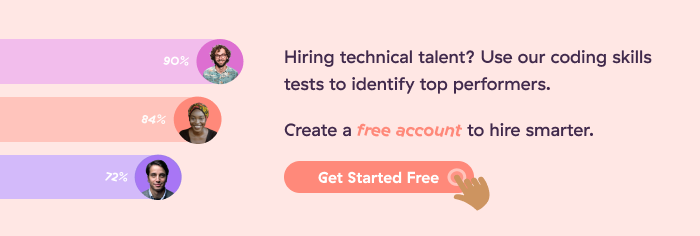
What features to look for when comparing HackerRank alternatives
When it first entered the market, HackerRank broke new ground by simulating real-world coding challenges. Companies could set assignments based on actual projects, gaining insights into how candidates perform at work.
While that’s great, the platform currently doesn’t have great reviews for users needing to assess other skills like software development, system-building, management, or communication. So, what should you look for in next-generation candidate testing tools?
Diverse question library
The best testing systems feature diverse question libraries because, with more questions available, you can build specific tests for each position.
Ideally, hiring teams can build coding tests for all major programming languages, frameworks, and difficulty levels. And look for regularly updated questions set by industry experts. This ensures tests are relevant to cutting-edge industry needs.
Customizable assessments
Candidates’ skills requirements will be very different. For example, some engineering roles are almost exclusively technical, demanding a narrow critical skill base. Other hybrid roles mix coding, system architecture, and personnel management.
Customizable tests make it easy to tailor tests and assess every skill the role requires. You can match candidates with specific job requirements or focus on specific languages or software packages.
Especially with so many different programming skills and languages to test for, customizable assessments are also essential for providing a more accurate measure of a candidate’s abilities and fit for the role.
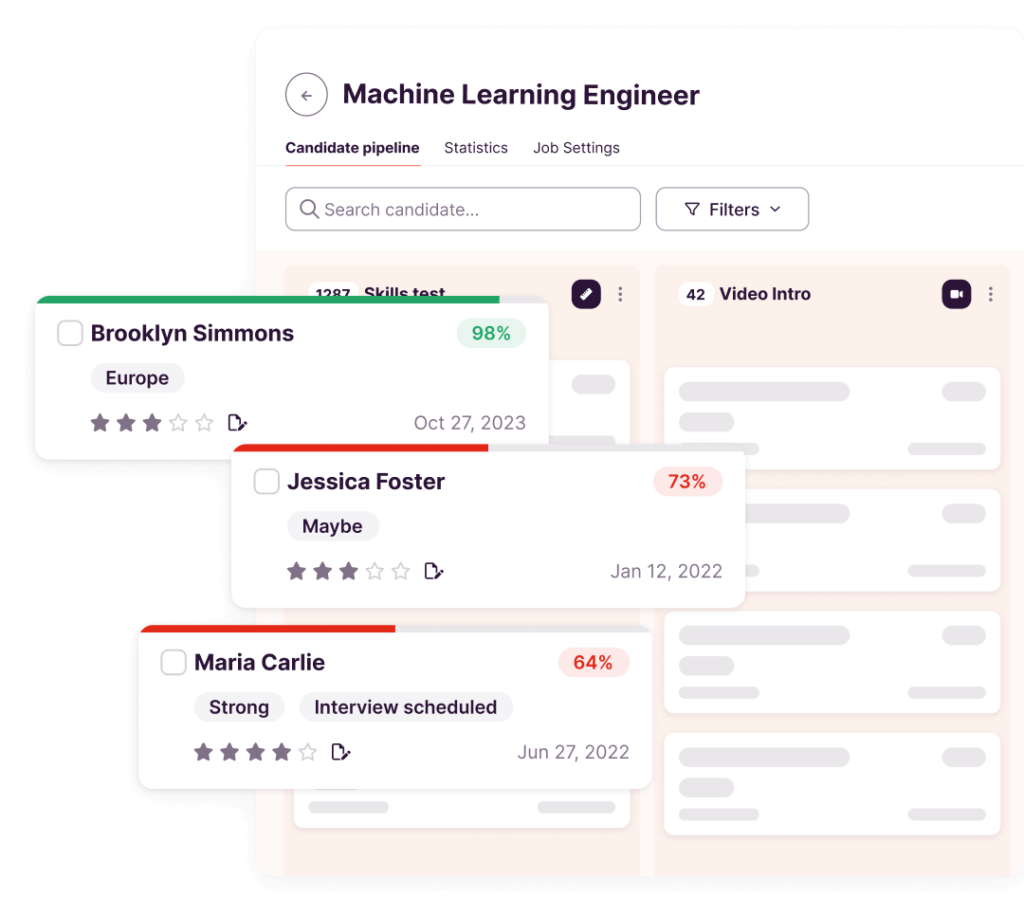
Real-world problem solving
Applied testing is also vital. Older systems tend to focus on examination-style assessments, but these tell you little about how candidates will perform in the workplace. High-level testing platforms solve this problem by using real-world scenarios to assess problem-solving and communication skills.
Detailed analytics and reporting
Testing analytics provide invaluable feedback about candidate performance and general hiring. With relevant data structures, you can make informed hiring decisions and refine how you assess future candidates.
Advanced testing systems include automated scoring and candidate feedback, as well as long-term performance tracking. Hiring managers can use them to identify trends or weak spots and take action to improve their sourcing systems.
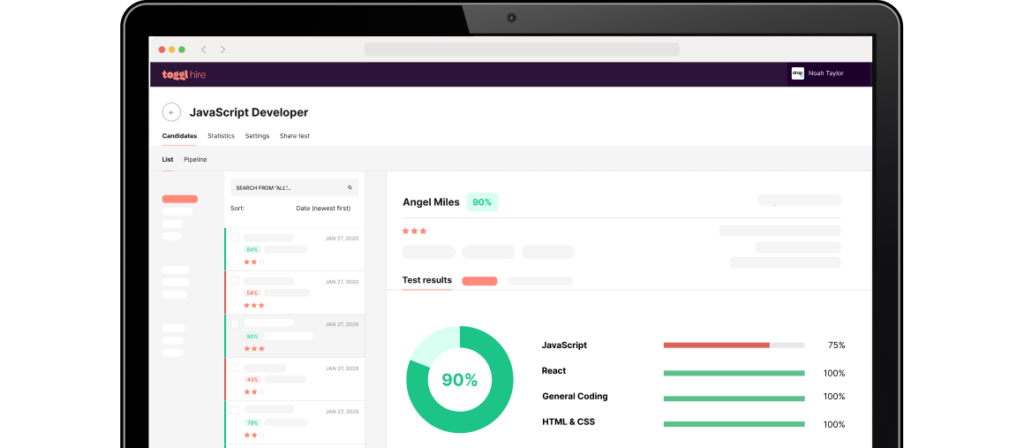
Integration capabilities
Finally, leading testing platforms integrate seamlessly with application tracking systems, HR databases, and general workflows to help you streamline the hiring process.
Hiring teams should be able to automatically schedule custom tests for those candidates who progress after the screening phase. They should also be able to communicate about promising candidates and provide selection panels with high-quality data to inform hiring decisions.
What are the best HackerRank alternatives?
Most HackerRank competitors fill specific niches in the recruitment landscape. It’s worth taking the time to evaluate them properly, as the right choice for one company may not suit another. Luckily for you, we’ve done the heavy lifting and have reviewed the 11 best alternatives and what they offer.
Top Tip: Use the curated list below to compare HackerRank substitutes. Keep in mind your current and future hiring needs. And remember to factor in costs, as large-scale coding tests can challenge your recruitment budget.
1. Toggl Hire
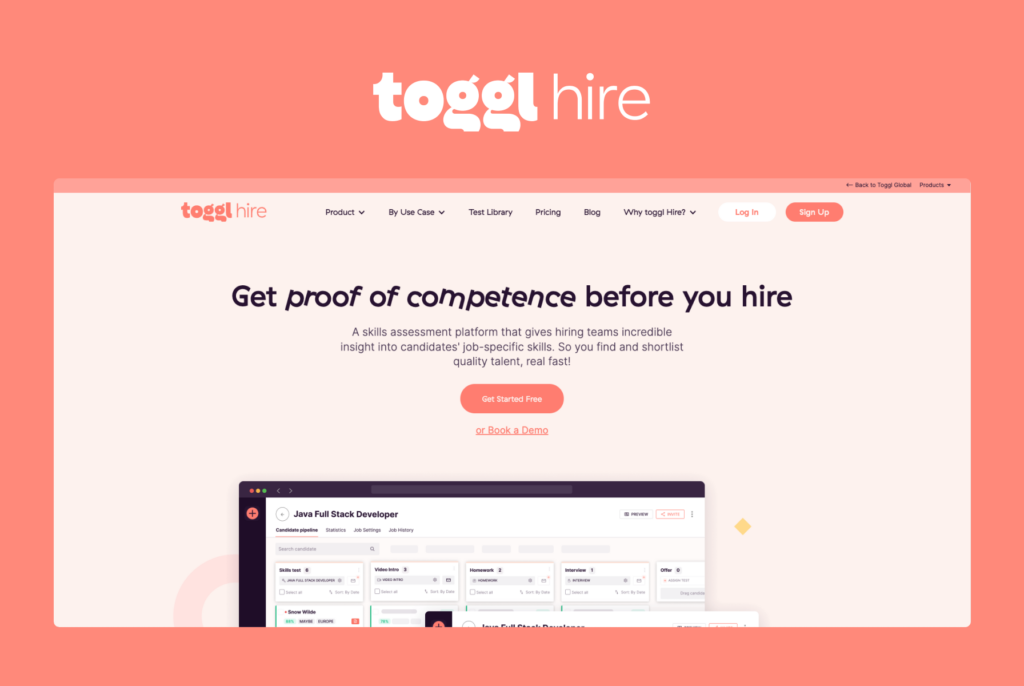
We don’t want to sound biased, but Toggl Hire is a great starting point, especially if you’re looking for a coding test platform with ease of use and speed at the forefront.
Toggl’s ATS features include candidate filtering, video intros, communication capabilities, and more. Recruiters can create smooth pipelines for every candidate, ensuring a consistent experience. The process is quick and seamless for candidates and companies alike.
We also combine coding tests with all-around assessments, like personality or cognitive ability tests, for more hybrid roles. For instance, companies can assess technical abilities as well as soft skills like managing teams or solving problems.
Who is it for? Companies that need to assess every aspect of a candidate’s skills and personality are looking for a more robust ATS-like hiring software than just a skills testing tool. Toggl Hire’s versatility helps you choose skilled hires who fit your business culture. That’s hard to achieve with other solutions.
Pros
Test coding skills, personal qualities, and other professional abilities to obtain holistic candidate assessments
Integrate programming tests with interviews, assignments, and candidate screening
Provide simple digital tests or use home assignments to obtain deeper insights
Agile and remote first. Ideal for companies with distributed hiring teams
Try before purchasing with our free account or benefit from low-cost paid packages
Cons
Our coding tests do not feature gamification or live coding (which may make them less suitable for high-end engineering positions)
Pricing
Toggl’s offers transparent and affordable prices. The free account lets you test Toggl with three users, while the Basic package costs $25 per month and includes 20 invites. Premium costs $100 monthly, while Business costs $469 monthly and has no limitations.
2. Codility
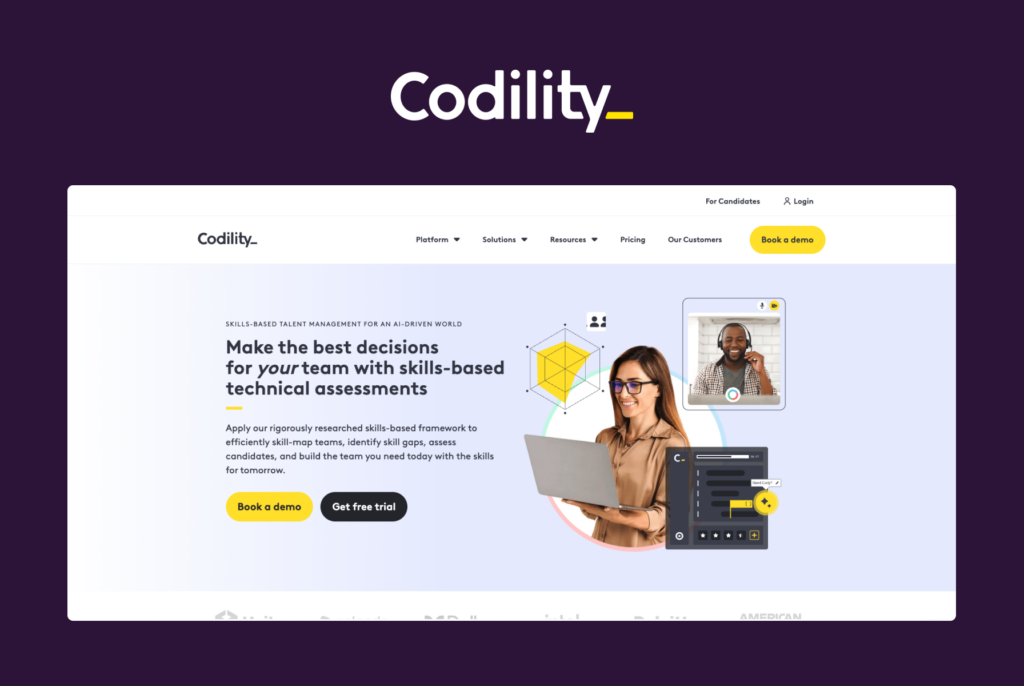
Codility has been around since 2009, making it one of the most experienced providers on this list. The testing platform has three core aims: enabling remote assessments, reducing hiring bias, and improving hiring speed.
Tests are pitched at relatively advanced levels, featuring live coding tasks. You can set up interviews via CodeLive, and test results also feed directly into ATS systems via the Codility API.
Who is it for? Codility is useful for high-end hiring in specialized roles, especially senior engineers.
Pros
The easy-to-use library of live coding tests covers over 40 common programming languages
Testing integrates neatly with popular ATS tools, generating data to inform hiring
The remote-first solution makes it easy to test candidates wherever they are
Anti-cheating systems help ensure unbiased decisions
Cons
Tests focus narrowly on technical tasks, meaning users have limited scope to test soft skills or other role requirements
Tasks are not always relevant to real-world situations
There are no ATS-like features or hiring pipelines to help you organize your hiring efforts
Pricing
The Starter package costs $1,200 annually and includes 120 candidate invites. Above that, Scale costs $5,000 annually (or $500 monthly) and includes full access to the assessment library.
3. CodeSignal
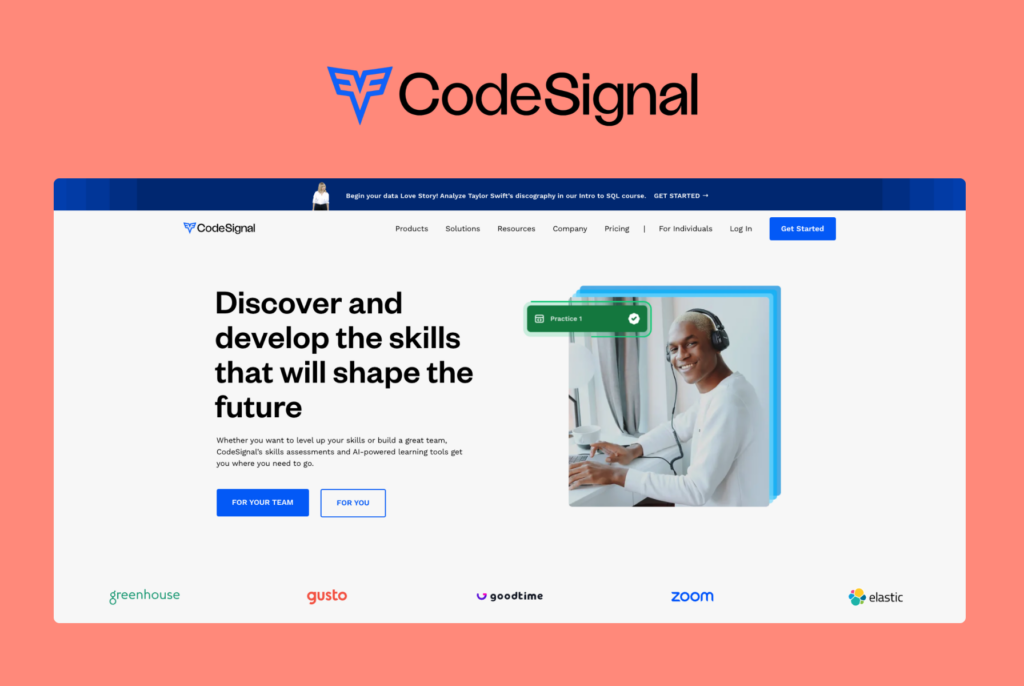
Created “by developers for developers,” CodeSignal offers professionally designed tests across over 70 programming languages. Recruiters and candidates benefit from the intuitive UI and the accurate plagiarism checker.
CodeSignal shines with its simulations of working environments, making it easier for companies to upskill existing employees with tests replicating actual projects. They can also screen initial applicants or integrate coding tests into interview assessments.
Users, however, have reported technical issues, including unexplained outages and a faulty code editor. Perhaps more importantly, CodeSignal’s customer service is often criticized, along with the poor quality of feedback after a candidate finishes their test.
Who is it for? CodeSignal is ideal for recruiting developers with clearly defined work tasks.
Pros
Crisp, easy-to-use UI enabling pre-screening, interview assessments, and in-work tests
Good at simulating real-world tasks
More than 70 programming languages
Cons
Poor feedback functions leave candidates and companies confused
Technically unreliable, leading to a poor UX
Mainly focused on building skills. Relatively shallow integration with hiring tools
Pricing
The CodeSignal website does not include prices for the Enterprise subscription. Individual packages start at $24 per month, but costs for hiring teams are much higher.
4. TestGorilla
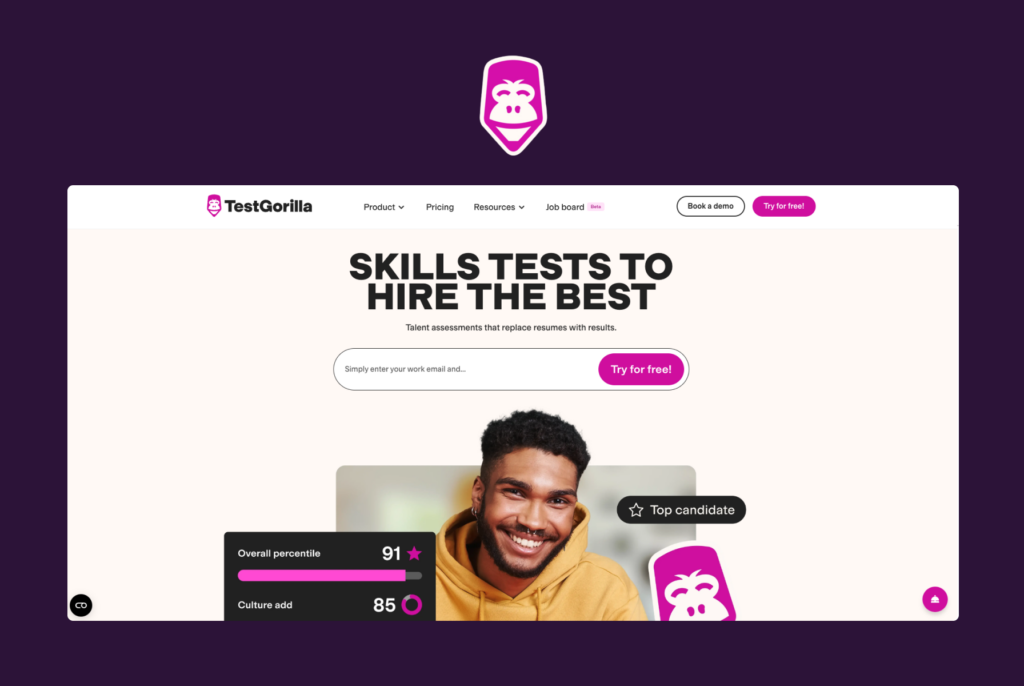
TestGorilla helps companies identify tech talent via diverse tests, ranked shortlists, ATS integration, and other bias-reducing features. You can also test cultural fit and skills like communication, generating a rounded view of each applicant.
However, TestGorilla’s performance doesn’t always match its advertised capabilities. The live coding system is buggy and unreliable, and customer service support has been criticized for slow responses. The pricing model is rigid, and it’s easy to buy more features than you need.
Proctoring tools provide extra assurance, but they are also slightly invasive, resembling candidate surveillance. On the plus side, video interviews work well. TestGorilla also makes it easy to review results and make selections.
Who is it for? Great for companies that need to fill DevOps teams with coding skills and ensure a decent cultural fit.
Pros
Test core development skills and soft skills to gain full knowledge about candidates
Simple UI and proctoring functions to eliminate cheating
Video interviews supplement coding tests to make better decisions
Cons
Customer service support is often unhelpful
Unclear pricing model leading to excessive costs
Technical issues can make assessments frustrating
Building job-specific assessments can be time-consuming
No hiring pipeline or advanced ATS-like features
Pricing
The free account lets you create five tests and invite unlimited candidates. Beyond that, Starter packages cost $75 monthly. Pro costs $115 monthly and includes ATS integration. It should be the best option for larger businesses.
5. HR Avatar
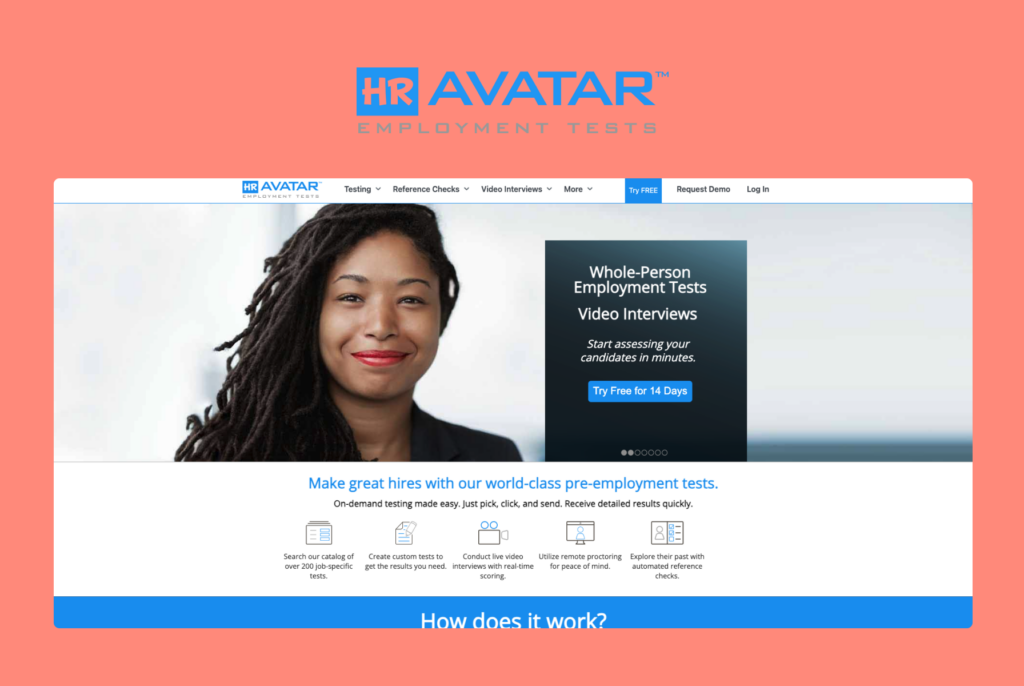
HR Avatar offers a unique approach to pre-employment assessments. Its tests feature animated avatars who lead candidates through scenarios or role-related tests, creating an immersive and fun user experience.
HR Avatar’s focus isn’t entirely on coding, though, and doesn’t let you focus on specific languages or DevOps systems. Instead, Tests focus on pre-defined roles, covering software development, operating systems architecture, and many related fields.
On the positive side, the combination of technical and personality tests helps to discover more about how candidates might perform. Video interviews, remote proctoring, and automated reference checks also create a smooth hiring pipeline.
Who is it for? Companies that focus on competencies over coding skills.
Pros
Enjoyable user experience
Whole-person assessments generate a rounded view of candidates
Video interviews and proctoring make the process easier
Cons
Tests are based on pre-defined roles and won’t always suit employer needs
Limited customization
Very expensive when used at scale
Pricing
HR Avatar is not cheap. Single candidate packages cost $50, packs of 50 cost $1,430 while screening 500 applicants costs $12,300.
6. WeCP
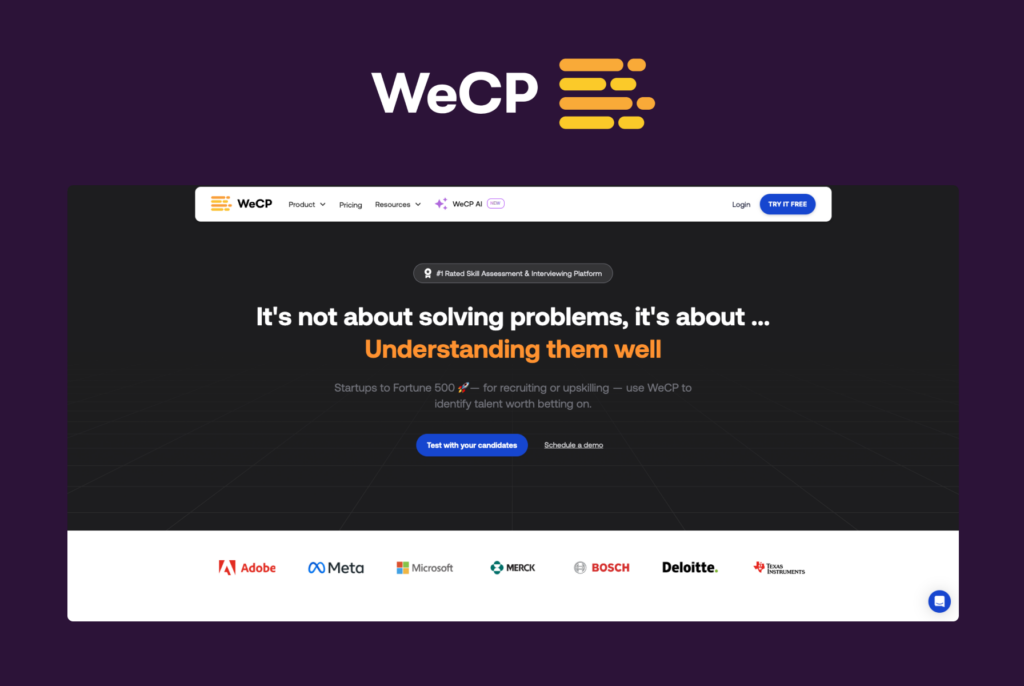
WeCreateProblems is an assessment platform with problem-solving at its heart. WeCP sets work scenarios based on real-life challenges, including hundreds of programming tasks.
The interface assesses how candidates solve problems and approach coding challenges (not just their outputs). AI-powered proctoring identifies cheating. Personalized communications add a human touch to what can be a stressful experience.
Using WeCP, hiring professionals can automate assessment delivery, allowing testing at scale. Efficient testing frees up time for interviews or other screening measures. Plus, the testing library is also huge, with questions for every role or hiring process.
Who is it for? Businesses that prefer testing problem-solving skills above pure technical skills.
Pros
Many scenarios and questions, with good coverage of coding themes
Intuitive live coding environment that makes testing the quality of work and candidate techniques easy
Personalized communications to improve the user experience
Cons
Uploading your questions or content is not easy, and customization can be a pain
Not the best platform for grading soft skills or personalities
Can become expensive at scale
Pricing
500 credits cost $2,388 per year. One credit represents a single candidate process, including tests, proctoring, ATS integration, and video interviews.
7. HackerEarth Assessments
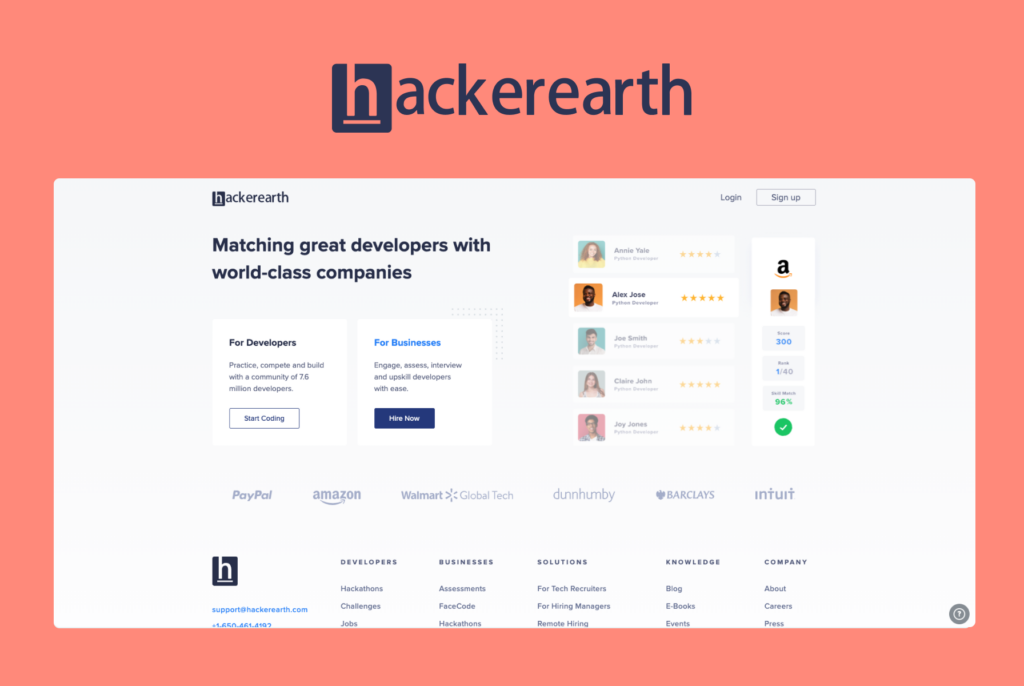
HackerEarth emerged from the hackathon scene, aiming to boost hacking skills and general coding expertise. The site remains a hub for hackathons and industry meet-ups, with a global community of over 7.6 million members.
Its assessment module has also become a popular way to assess candidates and identify elite developers. While users can ask over 17,000 questions and test 900+ skills, creating testing templates for individual roles is tricky.
If you have a specialist developer role in mind, the interface works great. Plug in languages or critical skills, and you’re good to go.
Who is it for? Businesses focused purely on coding and nothing else. Testing soft skills is not a HackerEarth specialty. Think of it as a technical testing tool, not a fully-rounded hiring ally.
Pros
Slick UI and ATS integration with a console that is easy to navigate and technically reliable
Useful for testing a developer’s skills with lots of targeted questions
Thriving user community to tap into and guide recruitment
Cons
Ineffective for testing all-round job skills and culture fit
Narrow focus outside of developer jobs
Expensive compared to alternatives
Pricing
The 14-day free trial gives a taste of what HackerEarth offers. After that, prices increase quite a bit. Enterprises can expect to spend $419 per month.
8. iMocha
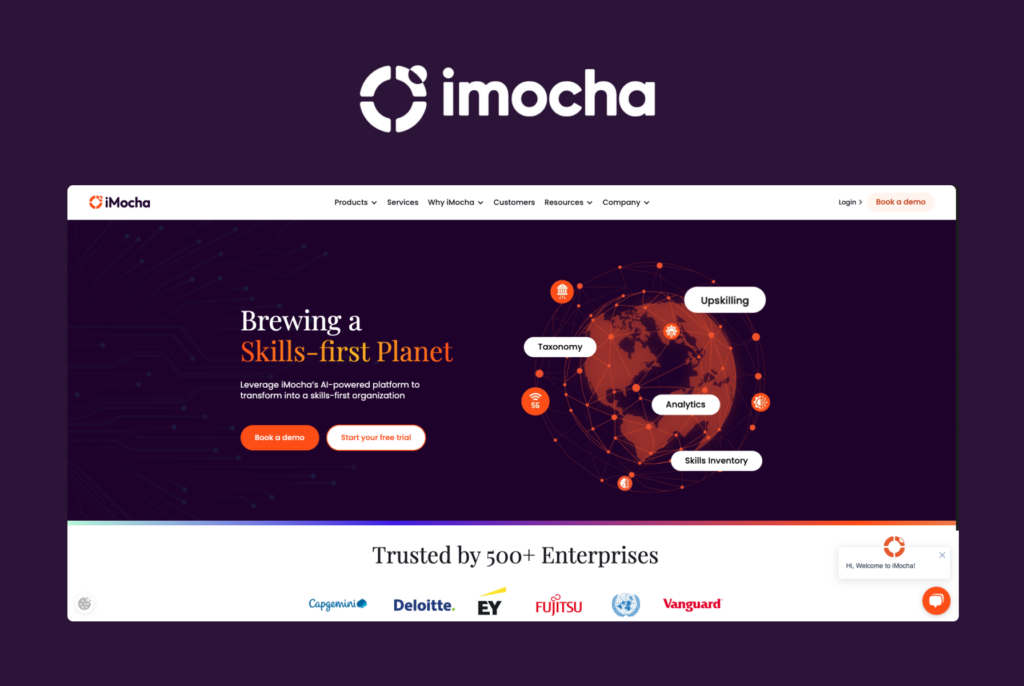
iMocha claims to maintain the biggest tech skills testing library, covering over 3,000 skills. Not only that, but iMocha also offers functional skills testing. For instance, you can test Salesforce development or supply chain management.
Functional testing complements aptitude and personality tests, communication assessments, and customization. Overall, this up-and-comer does everything HackerRank does and a bit more.
However, there are some issues. Analyzing test results is complex, and the UI is generally cluttered. Personalizing test invites and communications could be simpler. Users also can’t fully customize test scoring or timing. You have to accept iMocha’s templates in most cases.
Who is it for? Companies testing large numbers of candidates with relatively low user experience expectations.
Pros
Wide range of programming tests, including functional tests based on popular applications
Neat integration of technical and soft skills
Good English language assessments (which can be handy for hiring worldwide)
Cons
Customizing tests is difficult
Poor data analysis, which makes it hard to track hiring metrics
A lack of personalization options may alienate candidates
Unclear pricing policy
Pricing
iMocha offers a free trial, which is good. However, the website does not include transparent pricing information.
9. Codeaid
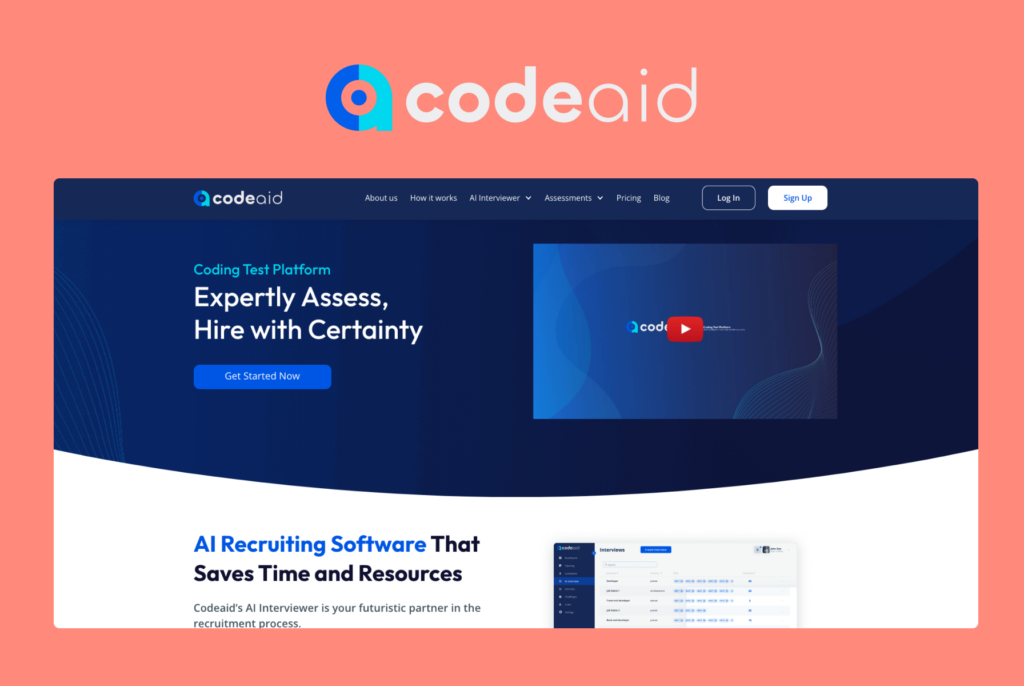
Codeaid offers more in-depth coding tests that typically last five times longer than HackerRank’s. Extended tests deliver deep insights into candidate skills. However, they make Codeaid slightly unwieldy for fast and efficient hiring.
The best aspect of Codeaid is its ability to mimic workflows. Tests immerse candidates in realistic environments, challenging them to engage with on-the-job tasks.
Assignments assess problem-solving, programming language levels, design pattern usage, and more. Proctoring systems guard against the use of ChatGPT and AI tools. Candidate outputs also translate instantly into data visualizations, letting you decide the best hire.
Who is it for? High-end hiring tasks for senior engineers and demanding situations.
Pros
Deep assessment capabilities, exploring real-life situations
Robust data visualizations and analytics to identify the best talent
Dependable anti-cheating mechanisms
Good free trial with plenty of features
Cons
Complex to use and suited to specific recruitment challenges
Not suitable for entry-level hiring
Quite expensive for large-scale hiring
Pricing
The free trial lets you assess five candidates monthly. The Team package costs $99 monthly and increases your quota to 20 invites. Enterprise costs $399 monthly and allows unlimited invites.
10. HireVue
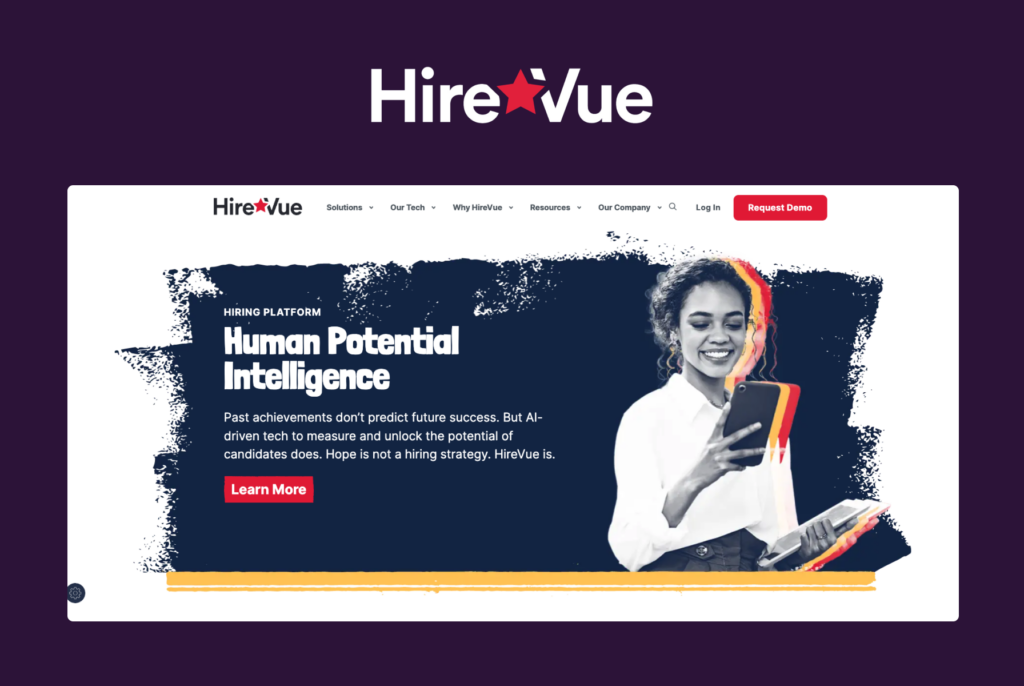
HireVue is all about “unlocking human potential” through the power of AI. Users can administer virtual tryouts by video, send skills tests to candidates, or use gamified assessments.
AI aside, structured technical interviews are a standout feature of HireVue. Recruiters can video questions and tailor interviews for every candidate. This aids remote hiring, cuts bias, and saves time vetting candidates.
HireVue is not famous for its coding assessments. You can assess skills via coding challenge tools. However, the testing library is comparatively limited.
Who is it for? General hiring processes that mix technical proficiency with other assessments. A good option for recruiting entry-level coders.
Pros
Excellent video interview features
AI analysis may improve candidate assessment and deliver insights about the best fit for each role
Integrations with Workday and ATS systems like SmartRecruiters
Cons
Not a coding specialist platform
Do not expect in-depth assessments of domains, many languages, or DevOps tools
Expensive
Pricing
Users can sample HireVue via a free demo, but the hiring platform is costly. The Essential package starts at $35k per year, while enterprise starts at $75k. Not suitable for small or new businesses.
11. Mettl
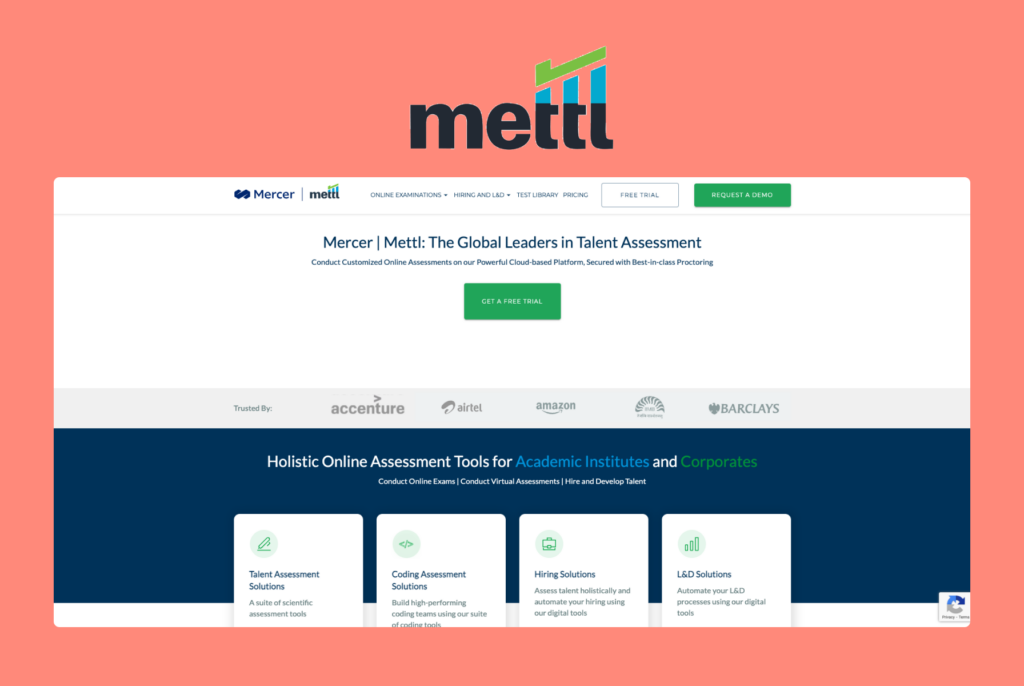
Mettl was founded in India in 2010 and has earned a global reputation for its comprehensive talent assessment capabilities. Mettl has a lot of features, allowing users to test over 600 skills and choose from over 100,000 questions.
Automatic grading and report generation keep recruiters informed, and the Mettl live interview platform dovetails neatly with tests. Bilingual testing helps when screening a global talent pool. You can also run simulations to find the right candidates for each position.
However, Mettl struggles with integrations, making it hard to slot coding tests into your hiring pipeline. And the cost can be excessive at volume, so it’s far from a flawless product.
Who is it for? Companies that test internal coding expertise and mid-level recruitment challenges.
Pros
Many questions and scope to customize coding tests
Video interviews, automated grading, plagiarism checks, and work simulations contribute to an impressive feature set
Bilingual assessments suit global workforces
Cons
Expensive for some implementations
Poor integration capabilities.
Pricing
Mettl offers a stripped-back free trial. The website does not detail paid package costs. However, tailored packages cost thousands of dollars per year.
Quick tips for testing programming skills
Before we finish, it’s important to remember that testing platforms only work when used correctly. Hiring technical talent entails using the correct assessments at the right time. Let’s quickly explain how this works.
Incorporate non-coding skills tests
First, don’t focus solely on coding. Obviously, you need robust assurance of coding skills. However, successful hires also have the social and intellectual skills needed to fit your corporate culture.
Test for problem-solving and critical thinking abilities. Assess logical reasoning, communication skills, teamwork — anything that meets your ideal candidate profile.
Customize tests to fit the role
Users should also customize tests to reflect real-world job tasks. This entails blending technical skills with problem-solving. Aim to mirror situations teams face as they meet deadlines and deliver critical services.
Remember: testing should filter candidates who can fill your specific role. Finding skilled or capable candidates is just the first step. A good testing platform lets you go deeper.
Assign (paid) take-home projects
We recommend mixing digital tests with homework assignments. Home projects shed light on how developers organize time and deploy their skills. A promising developer on paper may struggle to meet deadlines. Homework identifies these problems before they occur in the workplace.
Pay candidates for time-consuming assignments. Applicants hate being exploited by hiring processes and will quickly head elsewhere.
Try Toggl Hire coding tests for free
Skills testing is a crowded market, especially when finding your next tech superstar. As we’ve seen, testing platforms vary greatly in their core features, pros and cons, support, and pricing, making it crucial to pick the one that meets your unique business needs.
We think Toggl Hire ticks critical hiring boxes for most companies.
Our tests cover critical coding challenges, easy to administer, fun to take, and slot seamlessly into hiring pipelines. Recruiters can build custom assessments blending tech tasks and soft skills to find qualified talent.
Find out more by creating a free account today.

Elizabeth is an experienced entrepreneur and content marketer. She has nine years of experience helping grow businesses and has experienced first-hand the impact of skills-based hiring in today's global, digital world.




